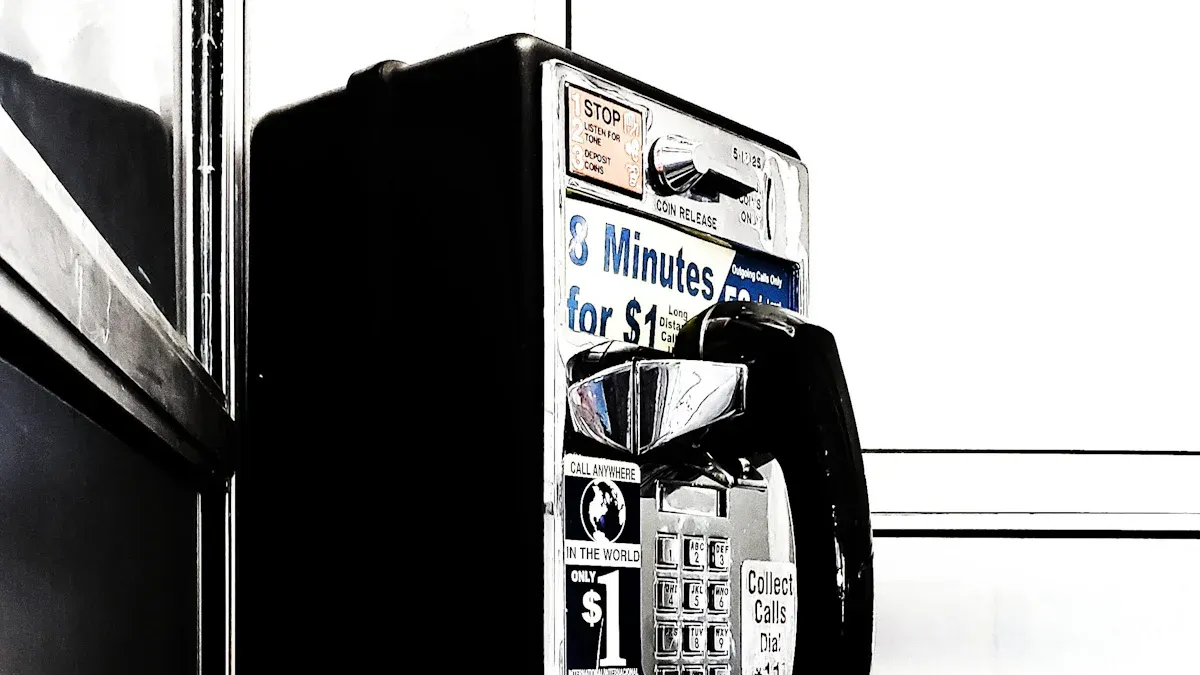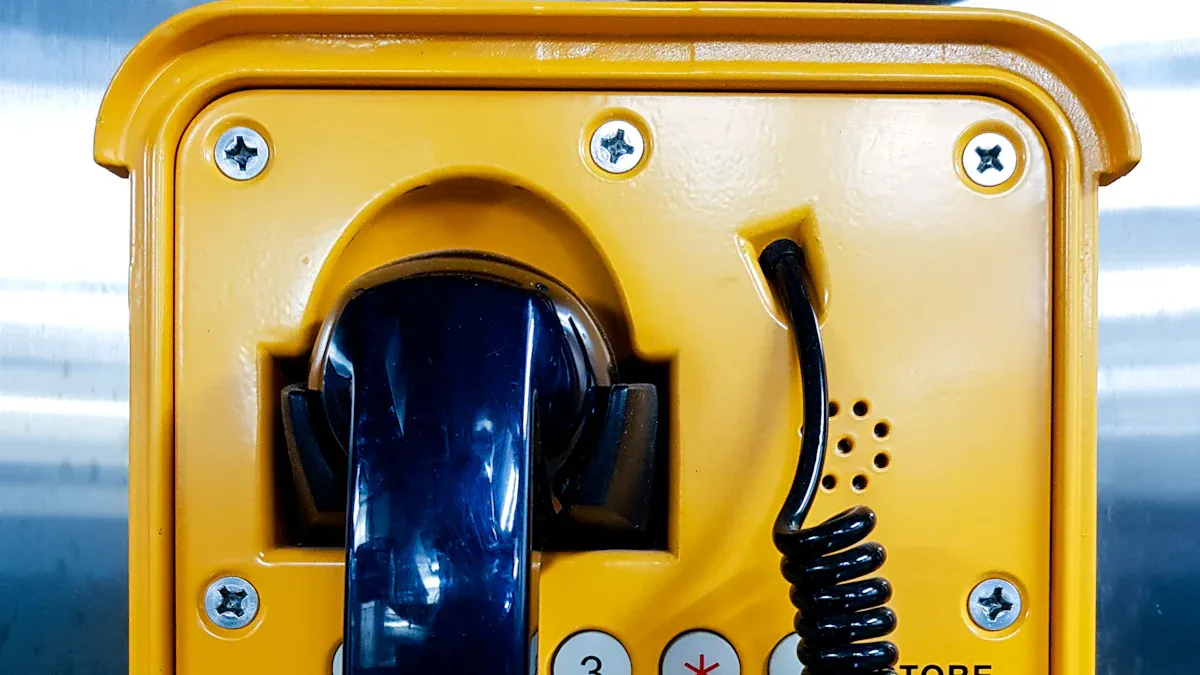
Heavy-duty industrial telephone handsets are specially designed for tough environments. They play a crucial role in ensuring reliable communication in extreme duty cycles, where standard handsets often fail. In fact, rugged industrial telephone handsets show nearly zero critical failures after extensive use, while traditional models can fail over 10 times more often in just weeks. This durability and reliability are essential in harsh conditions.
Key Takeaways
- Heavy-duty telephone handsets are designed to withstand extreme conditions, ensuring reliable communication in harsh environments like power plants and railways.
- These handsets use durable materials, such as stainless steel and robust plastics, to resist corrosion, dust, and moisture, enhancing their longevity.
- Regular maintenance, including inspections and digital tracking, is crucial for maximizing the reliability and safety of heavy-duty handsets in industrial settings.
Features of Heavy-Duty Telephone Handsets

Heavy-duty telephone handsets are built to withstand the toughest conditions. Their features play a vital role in ensuring they perform reliably in extreme environments. Let’s explore the key aspects that make these handsets stand out.
Materials Used
The materials used in heavy-duty telephone handsets significantly contribute to their durability and longevity. Here’s a quick look at some of the most common materials and their benefits:
| Material Type | Key Feature | Contribution to Durability |
|---|---|---|
| 316 Stainless Steel | Corrosion resistance | Ideal for harsh environments, especially marine. |
| Durable Plastics | Enclosure protection | Prevents corrosion and damage from elements. |
| IP66 Rating | Dust-tight and water-resistant | Ensures longevity in wet and dusty conditions. |
| NEMA 4X Rating | Water-tight and corrosion-resistant | Suitable for outdoor installations. |
These materials ensure that the handsets can endure exposure to moisture, dust, and other harsh elements. This durability is crucial for maintaining communication in environments like power plants and railways.
Design Considerations
Design plays a crucial role in the usability and resilience of heavy-duty telephone handsets. Manufacturers consider various factors to ensure these devices can withstand extreme temperatures and physical impacts. Here are some key design features:
| Feature | Description |
|---|---|
| Ingress Protection (IP) Ratings | Ensures resistance to dust and water, crucial for durability in various environments. |
| Military Standards (MIL-STD-810H) | Tests equipment under extreme conditions, ensuring high durability and performance. |
| Reinforced Screens | Provides additional protection against impacts and scratches. |
| Robust Frame Construction | Enhances structural integrity to withstand physical shocks and drops. |
| Battery Performance in Extremes | Designed to function in extreme temperatures, with larger batteries to mitigate performance issues. |
| Temperature Extremes Testing | Evaluates performance in high and low temperatures, ensuring reliability in diverse climates. |
These design considerations help reduce discomfort and the risk of injury for users. Ergonomics is essential, especially in industrial settings where workers use these devices for extended periods. A well-designed handset can enhance comfort and productivity, preventing repetitive strain injuries.
Technological Enhancements
Modern heavy-duty telephone handsets incorporate advanced technology to improve performance in hazardous environments. Here are some notable enhancements:
- Advanced radio frequency shielding to prevent ignition risks.
- Secure and reliable communication protocols for constant connectivity.
- Integration of smart features and IoT capabilities for enhanced monitoring.
Additionally, features like GPS tracking and wireless communication facilitate reliable communication without physical connections, reducing ignition risks. The rugged enclosures ensure that these handsets can withstand harsh conditions, while advanced audio processing guarantees clear communication even in noisy environments.
For instance, the Yealink W78H DECT handset integrates advanced noise cancellation technology. This feature enhances audio delivery by increasing volume while reducing background noise, ensuring that conversations remain clear and clean.
These technological advancements make heavy-duty telephone handsets not just durable but also highly functional, meeting the demands of various industrial applications.
Applications in Power Plants

Power plants operate in demanding environments where reliable communication is essential. Heavy-duty telephone handsets play a crucial role in ensuring that workers can communicate effectively, even in the most challenging situations.
Communication Needs
In power plants, clear communication is vital for daily operations. Workers rely on heavy-duty telephone handsets to stay connected, especially during emergencies. These handsets allow personnel to:
- Coordinate tasks efficiently.
- Report issues immediately.
- Ensure safety protocols are followed.
The ability to communicate without interruption can prevent accidents and enhance overall productivity. Heavy-duty handsets are designed to function in noisy environments, ensuring that messages are transmitted clearly.
Safety Protocols
Safety is a top priority in power plants. Heavy-duty telephone handsets must meet strict safety standards to ensure they can be used in hazardous conditions. Here’s a look at some of the key certifications these devices must have:
| Certification | Description |
|---|---|
| UL Certification | Indicates suitability for use in hazardous locations with flammable gases, vapors, and dust. |
| ATEX Certification | Certifies equipment for potentially explosive atmospheres in the EU, with categories for different hazard levels. |
| IECEx Certification | Assesses product conformity for use in hazardous areas, recognized globally. |
| CSA Certification | Ensures compliance with Canadian safety standards for intrinsically safe equipment. |
| NEC and CEC Compliance | Outlines regulations for intrinsically safe equipment in the US and Canada. |
These certifications ensure that the handsets can withstand the risks associated with power plant operations. They help prevent accidents and protect workers from potential hazards.
Environmental Challenges
Power plants face numerous environmental challenges, including exposure to chemicals, dust, and moisture. Heavy-duty telephone handsets are specifically designed to handle these conditions. Here are some key features that enhance their performance:
- Designed for outdoor installations and hazardous environments.
- Capable of withstanding heavy rain and humidity.
- Ensures reliable communication in chemical plants.
These handsets often feature:
| Feature | Description |
|---|---|
| Explosion-Proof | Designed to prevent ignition in flammable environments. |
| Weatherproof | Constructed to resist moisture and dust ingress. |
| Rugged Materials | Built to withstand corrosion and impact. |
For example, the VoIP Explosion-proof Industrial Telephone is encased in a corrosion-resistant aluminum housing. This design provides complete protection against dust and moisture, ensuring high reliability even in extreme conditions.
Applications in Railways
Railways operate in unique environments that demand reliable communication systems. Heavy-duty telephone handsets are essential for ensuring safety and efficiency in these settings. Let’s dive into how these handsets meet the specific needs of railway operations.
Operational Requirements
Railway environments present distinct challenges that heavy-duty telephone handsets must address. Here’s a breakdown of the operational requirements unique to these settings:
| Requirement Type | Description |
|---|---|
| Ruggedized Equipment | Must withstand harsh environmental conditions unique to railway operations. |
| Integration with Systems | Needs to seamlessly integrate with existing communication systems used in rail environments. |
| Support for SCADA | Equipment must support various SCADA serial formats and interfaces for reliable connections. |
| Direct Transfer Trip | Ability to carry signals over modern transport methods like Ethernet when traditional lines fail. |
| Analog Phone Systems | Support for SIP and analog systems, including crash phones, ensuring communication reliability. |
These requirements ensure that railway personnel can communicate effectively, even in challenging conditions. Heavy-duty telephone handsets are strategically installed in key areas, such as platforms and control rooms, to facilitate clear communication among staff. This setup is crucial for coordinating daily activities and responding swiftly to emergencies.
Emergency Communication
In emergencies, every second counts. Heavy-duty telephone handsets play a vital role in railway emergency response protocols. Here are some key features that enhance their effectiveness during critical situations:
| Feature | Description |
|---|---|
| Vandal-Resistant Design | Constructed with durable stainless steel, ideal for high-traffic areas and protection against damage. |
| Multi-Functional Capabilities | Offers features like voice mail, handsfree operation, and programmable buttons for versatile communication. |
| Waterproof and Dustproof | IP55 rating ensures operation in extreme temperatures and exposure to dust and water. |
| Flexible Power Options | Can be powered via POE or DC12V, allowing for flexible installation without extra power sources. |
These features ensure that railway personnel can maintain communication during emergencies, enhancing safety and response times. The robust design of these handsets allows them to function effectively in various outdoor settings, making them indispensable for railway operations.
Maintenance and Reliability
To maximize the reliability of heavy-duty telephone handsets in railway environments, regular maintenance is essential. Here are some recommended practices:
| Maintenance Practice | Description |
|---|---|
| Durable Labels | High-quality labels help in organizing, identifying, and tracking parts and maintenance schedules. |
| Regular Inspections | Frequent inspections help identify wear and tear, misalignments, and obstructions that could cause issues. |
| Digital Tracking of Maintenance Data | A centralized maintenance system is essential for effective tracking and management of maintenance activities. |
By following these practices, railway operators can ensure that their communication systems remain functional and reliable. Regular maintenance not only extends the lifespan of the handsets but also enhances overall safety and efficiency in railway operations.
Comparison with Standard Handsets
When comparing heavy-duty telephone handsets to standard models, several key differences emerge. These differences highlight why heavy-duty options are often the preferred choice in industrial settings.
Durability Differences
Heavy-duty handsets excel in durability. They withstand extreme conditions that would quickly damage standard models. Here are some notable durability features:
- Durability against extreme conditions: Rugged handsets resist dust, rain, and drops from significant heights.
- Corrosion resistance: Many heavy-duty models use materials like stainless steel, which can endure harsh environments.
- Impact resistance: These devices are built to survive physical shocks, ensuring they remain functional even after rough handling.
Functionality Variations
Functionality is another area where heavy-duty handsets shine. They come equipped with features that cater to the needs of frontline workers. Some of these features include:
- Push-to-Talk capabilities: Programmable buttons allow for instant communication, crucial in fast-paced environments.
- All-day battery life: Heavy-duty handsets typically have long-lasting batteries that recharge quickly.
- Glove compatibility: Many rugged phones can be operated while wearing gloves, making them ideal for fieldwork.
Cost-Effectiveness Analysis
While heavy-duty handsets may have a higher upfront cost, they often prove more cost-effective in the long run. Here’s a comparison of usage scenarios:
| Category | Usage Scenarios | Characteristics | Advantages | Disadvantages |
|---|---|---|---|---|
| Industrial Wall-Mounted Phones | Factories, warehouses | Stainless Steel Base, 500hr corrosion resistance | Withstands extreme environments, easy to clean | Higher upfront cost, heavier installation |
| Standard Office Telephones | Corporate offices | Plastic Housing, 100hr corrosion resistance | Cost-effective, lightweight | Fragile in harsh conditions |
| Heavy-Duty Hook Switches | Industrial workshops | Zinc Alloy, 30% stronger than plastic | Resists 500hr salt spray | Heavier than plastic |
Heavy-duty telephone handsets are essential in extreme environments. Their rugged design allows them to resist impact, vibration, and extreme temperatures. They also offer water and dust resistance, ensuring reliable performance. Choosing the right handset for specific applications can enhance safety and communication efficiency in challenging conditions. 🌟
FAQ
What makes heavy-duty telephone handsets different from standard models?
Heavy-duty handsets use rugged materials and advanced technology, ensuring durability and reliability in harsh environments where standard models may fail.
Are heavy-duty telephone handsets waterproof?
Yes, many heavy-duty handsets feature waterproof ratings, such as IP66, making them suitable for wet and dusty conditions.
How often should heavy-duty handsets be maintained?
Regular inspections every six months are recommended to ensure optimal performance and longevity in demanding environments.

